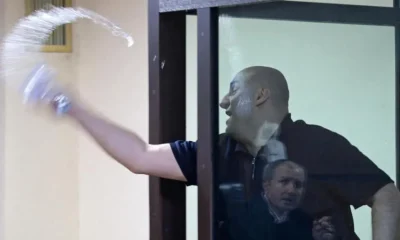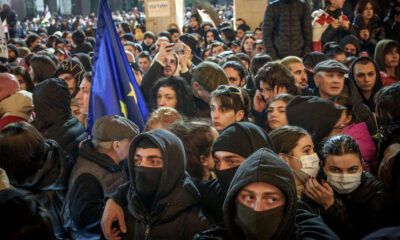International
Georgia: Mass protests grow entering fourth night
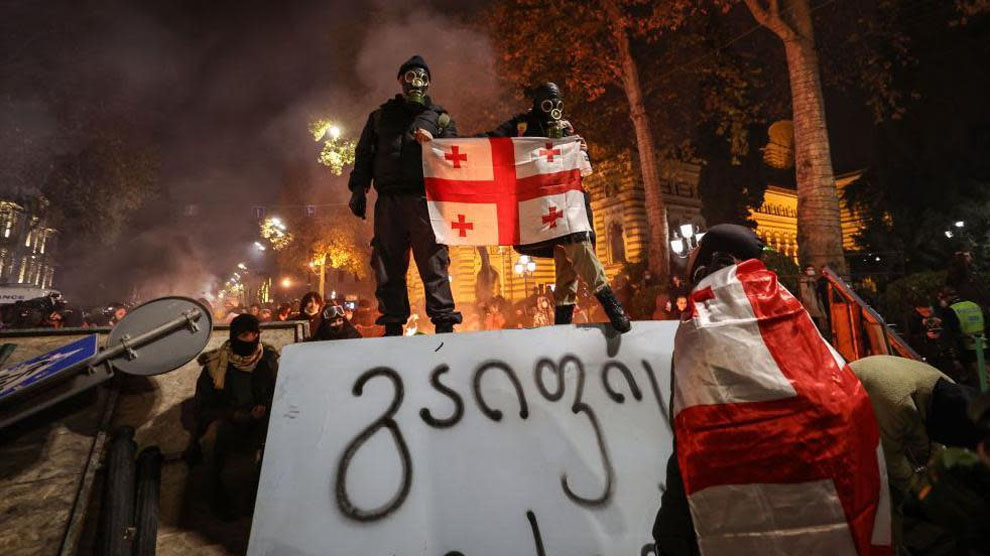
Georgia: Mass protests grow entering fourth night
Tens of thousands of Georgians took to the streets again Sunday as mass nationwide protests entered their fourth night. National media outlets reported demonstrations in at least eight cities, and protesters setting up roadblocks, as well as shutting down access to the Black Sea port of Poti.
Georgia has been rocked by unrest since the pro-Russian Georgian Dream party claimed victory in a contested October 26 vote.
The country’s opposition is boycotting parliament over the situation and the past several days have seen a massive uptick in civil unrest after Georgian Dream said it would pause Georgia’s accession bid to join the EU.
Georgian Dream says it made the decision to protect Georgia against outside meddling in its affairs.
The decision was announced by Prime Minister Irakli Kobakhidze on Thursday.
Incumbent President Salome Zurabishvili, who has called the Georgian Dream government “illigitimate,” has joined protesters calling for a new vote.
Zurabishvili has vowed to remain in office, decrying the vote and Thursday’s EU decision as unconstitutional and against the interests of the Georgian people.
On Sunday, Zurabishvili told a meeting of opposition leaders: “We only have one demand, which is based on the constitution. The only way to achieve stability is through new elections, there is no other way.”
Tbilisi: Protesters clash with police for third nightTo view this video please enable JavaScript, and consider upgrading to a web browser that supports HTML5 video
READ ALSO:
- Distress call leads troops to confront, kill many Zamfara terrorists
- Nigerian Army exposes 56 illegal oil refineries in one week
- Dozens killed in crush at Guinea football match – reports
Protesters at the door On Sunday, protesters in the capital, Tbilisi, gathered outside parliament, waving EU flags and banging on the institution’s front door, with many wearing protective masks to fend against tear gas, which police have used of late.
Uniformed officers have reportedly pushed some protesters away, forcing them to retrench near Tbilisi State University.
On Saturday, Prime Minister Irakli Kobakhidze had brushed off calls for a new vote.
“The formation of the new government based on the October 26 parliamentary elections has been completed,” he said.
The European Union has called for an investigation into the October ballot over “serious electoral irregularities” and has withheld recognizing the incoming Georgian Dream government as the legitimate winner.
The European Parliament has officially rejected the result and called for sanctions against Kobakhidze and others.
European Commission President Ursula von der Leyen on Sunday reaffirmed the EU’s openness to Georgia, despite a potential shift away from pro-European values. In a statement posted on X, von der Leyen expressed “regret” over the Georgian government’s decision to diverge from EU principles.
“The door to the EU remains open,” she wrote. “The return of Georgia on the EU path is in the hands of the Georgian leadership.”
President Zurabishvili dismissed Georgian Dream’s nomination for the presidency and claimed Saturday to have set up a “national council” of opposition parties. The council and the presidency, she said, would “ensure stability in this country.”
With Georgian Dream having approved its own claim to victory before a court could rule on Zurabishvili’s move to annul the vote, constitutional experts say any steps taken by the new government, including appointments, will be invalid.
Georgia: Suspension of EU bid reignites protests in TbilisiTo view this video please enable JavaScript, and consider upgrading to a web browser that supports HTML5 video
EU and US condemn excessive police force The police response to the protests has been robust, with more than 150 people arrested and officers chasing down and pummeling participants.
Rubber bullets, tear gas and water cannon have all been used over the past few days.
DW’s Tbilisi correspondent Maria Katamadze on Sunday posted images of police using water cannons as protesters shot fireworks at parliament.
READ ALSO:
- Nine retired INTELS workers die while awaiting terminal benefits – Report
- Nigeria, France sign agreement on mining sector development
- Pastor wrestles burglar who breaks into church during thanksgiving
The heavy-handed suppression of protests has drawn broad condemnation internationally, with the EU’s new top foreign policy representative, Kaja Kallas, warning against the use of excessive force against citizens.
Speaking in Kyiv, Ukraine, Kallas said, “It is clear that using violence against peaceful protesters is not acceptable, and [the] Georgian government should respect the will of the Georgian people, but also the Georgian constitution.”
In a post on the social media platform X, Kallas wrote, “We stand with the Georgian people and their choice for a European future” and warned of “direct consequences from EU side.”
European Commission President Ursula von der Leyen reiterated the EU’s open door to Georgia despite concerns over the country’s leadership apparently shifting away from pro-European principles.
“The door to the EU remains open,” she wrote on X. “The return of Georgia on the EU path is in the hands of the Georgian leadership.”
Along with Britain, France, Lithuania, Poland, Sweden and Ukraine, the United States also voiced its concern on the situation in Georgia.
“We condemn excessive force used against Georgians exercising their freedom to protest and have suspended our Strategic Partnership with Georgia,” said US State Department spokesperson Matthew Miller
The ever-present specter of Russia Polling has consistently shown that the majority of Georgians want their country to join the EU, a step that was formally enshrined in the constitution of the former Soviet republic. Still, Georgian Dream, like a handful of other European parties, has strong pro-Russian sympathies.
Pro-Russian ally Hungarian Prime Minister Viktor Orban was quick to show support for Georgian Dream’s victory claim, jetting to the country within hours of polls closing in October. He recently voiced support for Prime Minister Irakli Kobakhidze and his EU decision.
The Kremlin has yet to comment officially on the situation. Nevertheless, Moscow is following events closely, with Dmitry Medvedev, a hawkish former president, writing on Telegram, that an attempted revolution was underway in Georgia.
Georgia is “moving rapidly along the Ukrainian path, into the dark abyss,” he wrote, adding, “Usually this sort of thing ends very badly.”
Russia invaded Georgia in 2008 and maintains a military presence in both the Autonomous Republic of Abkhazia and the former South Ossetian Autonomous region of Soviet Georgia — both of which are widely recognized as occupied rather as independent territories.
Polls show a majority of Georgians want their country to join the European Union
Georgia: Mass protests grow entering fourth night
Image: Zurab Tsertsvadze/AP/picture alliance js/sms (AFP, dpa, Reuters)
International
UK Court Hands Life Sentence to Nigerian Teen for Knife Attack Killing
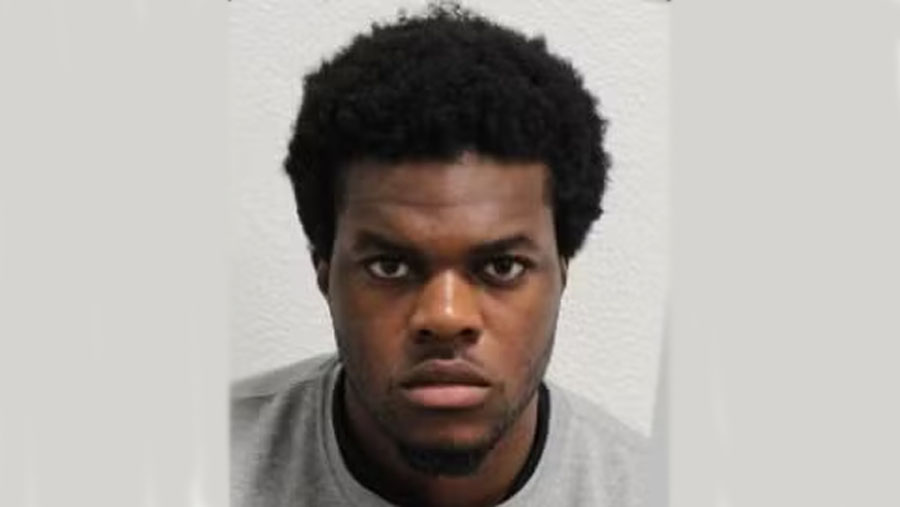
UK Court Hands Life Sentence to Nigerian Teen for Knife Attack Killing
A Nigerian teenager residing in the UK, Jackson Uwagboe, has been sentenced to life imprisonment for the murder of 21-year-old Robert Robinson, following a brutal knife attack in Lewisham, London. The sentencing was delivered at the Old Bailey on Wednesday.
The Metropolitan Police confirmed that 19-year-old Uwagboe of Hamilton Street, Lewisham, was found guilty of murder on Tuesday, 10 February 2026, in a case stemming from a dispute over a stolen bicycle. The court ruled that Uwagboe must serve a minimum of 21 years before he can be considered for parole.
Uwagboe’s co-defendant, Eromosele Omoluogbe, 24, was earlier convicted of perverting the course of justice after assisting Uwagboe in attempting to flee to Nigeria via Heathrow Airport.
READ ALSO:
- Ogun Gov Rewards Nigeria’s Best Primary School Teacher with Car, Bungalow
- Police Bust Gang Armoury, Arrest Two Suspects in Delta
- Peter Obi Launches ‘Village Boys Movement’ to Rival Tinubu’s City Boys Ahead of 2027
Prior to this sentencing, two other men, Ryan Wedderburn, 18, and Kirk Harris, had already been convicted and handed life sentences in May 2025 for their roles in the same murder.
Detective Inspector Neil Tovey, who led the investigation, described the incident as a “brutal and sustained attack”. He said, “Robert was subjected to a brutal and sustained attack by a group of men armed with knives. He was unarmed, already wounded, and on the ground when Uwagboe attacked him. Today’s verdict brings justice for Robert Robinson and his family.”
The case has drawn attention to youth violence, knife crime, and gang-related activity in London, as well as the challenges faced by law enforcement in preventing violent disputes over seemingly minor disputes such as bicycle theft.
The sentencing underscores the UK judicial system’s approach to serious violent crimes, ensuring that perpetrators face long-term incarceration while providing a clear minimum term before parole consideration.
UK Court Hands Life Sentence to Nigerian Teen for Knife Attack Killing
International
UK-Based Nigerian Gets 13-Year Jail Term for Forcing Girlfriend to Abort Pregnancy
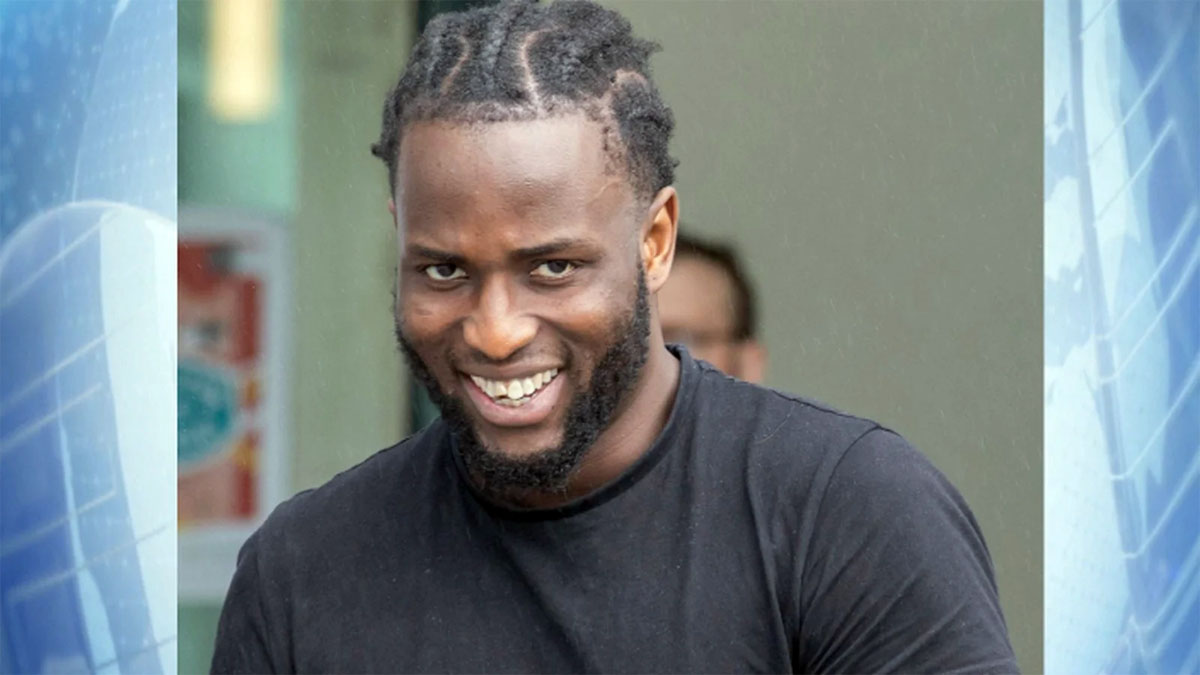
UK-Based Nigerian Gets 13-Year Jail Term for Forcing Girlfriend to Abort Pregnancy
A UK-based Nigerian man, Adeleke Adelani, has been sentenced to more than 13 years’ imprisonment for unlawfully aborting the pregnancy of his former partner after coercing her to take abortion medication on Valentine’s Day.
The offence occurred in 2020 when Adelani, then 28 years old, deceptively invited the woman — whose identity is legally protected — to his residence in Letterkenny under the guise of discussing the future of her pregnancy. Evidence before the court showed that the victim was nine weeks pregnant at the time of the incident.
Prosecutors told the court that upon her arrival, Adelani threatened the woman with violence and forced her to ingest five tablets of misoprostol, a drug used for medical abortions, thereby causing the unlawful termination of the pregnancy. The court heard that the defendant had researched the medication in advance and acted deliberately. The victim later contacted authorities, leading to Adelani’s arrest by Irish police.
READ ALSO:
- Lawmaker Jailed for Mocking President in Facebook Post
- Police to Arrest TikToker Mirabel After She Recants False Rape Claim
- Tinubu Reduces Reliance on U.S, Strengthens Defence Partnerships With Turkey, EU
At the time of the sentencing, Adelani was already serving a separate seven-year prison sentence for an unrelated offence. He had initially been due to stand trial last year but pleaded guilty before jury selection began, accepting responsibility for the charges brought against him.
During the sentencing hearing at the Letterkenny Circuit Court, the victim delivered a powerful impact statement, explaining that although she had chosen to forgive Adelani, the consequences of his actions would remain with her for life.
“I have forgiven the defendant,” she told the court. “That forgiveness does not mean what he did was acceptable. It means I refuse to let what he did continue to control my heart and my life. When he wrongfully imprisoned me and caused the termination of my nine-week pregnancy, he took far more than my freedom. He took my child. He took my sense of safety. He took a future that I had already begun to plan and love.”
In a letter read aloud in court, Adelani apologised to the victim, accepted full responsibility for his actions, and expressed remorse for the pain and trauma he caused.
Delivering judgment, John Aylmer described the crime as deliberate, premeditated, and deeply traumatic, stressing that it involved coercion, abuse, and a serious violation of trust. The judge sentenced Adelani to 11 years in prison, with the final two years suspended, for causing the unlawful termination of a pregnancy, and an additional five years, with the last 12 months suspended, for assault causing harm.
The sentences are to run concurrently, adding to Adelani’s existing term and resulting in an overall prison sentence exceeding 13 years. The case has reignited debate in Ireland and internationally about reproductive coercion, domestic abuse, and violence against women, with legal observers describing it as one of the most serious cases of its kind in recent years.
UK-Based Nigerian Gets 13-Year Jail Term for Forcing Girlfriend to Abort Pregnancy
International
Epstein, Ex-Israeli PM Named in Alleged Profiteering From Boko Haram Crisis

Epstein, Ex-Israeli PM Named in Alleged Profiteering From Boko Haram Crisis
A new investigative report by Drop Site News has alleged that the late American financier Jeffrey Epstein and former Israeli prime minister Ehud Barak leveraged Nigeria’s long-running Boko Haram insurgency to pursue commercial, security, and strategic interests in the country.
According to the investigation, emails released by the United States Department of Justice in 2018 show Epstein acting as a behind-the-scenes facilitator in discussions involving Jide Zeitlin, then chairman of Nigeria’s Sovereign Investment Authority, and Sultan Ahmed bin Sulayem, former chairman of DP World. The exchanges allegedly focused on attempts to secure control of key shipping terminals in Lagos and Badagry, following unsuccessful negotiations with successive Nigerian administrations dating back to 2005.
The report claims DP World was unwilling to invest in a proposed industrial zone in Nigeria without full or majority control of the adjoining port infrastructure, a demand that reportedly stalled the deal for years. Epstein, who died in a New York jail in 2019 while awaiting trial, is alleged to have helped revive talks by brokering introductions and strategic conversations.
READ ALSO:
- CBN Policies, Foreign Inflows Drive Naira to Two-Year Peak
- Edo Governor Okpebholo Names Mercy Johnson-Okojie Special Adviser
- Many Feared Dead as Suspected Lakurawa Militants Attack Kebbi Communities
Drop Site News further reported that bin Sulayem resigned on February 13 after renewed scrutiny of his past links to Epstein resurfaced publicly, intensifying attention on the historical port negotiations and the role of foreign intermediaries in Nigeria’s maritime sector.
Beyond logistics and port infrastructure, investigators highlighted what they described as near-daily correspondence between Epstein and Barak after the former Israeli leader left public office. Barak, who served as Israel’s defence minister until 2013, allegedly sought to deepen Israeli-Nigerian security cooperation, using Nigeria’s counter-insurgency battle as an entry point for Israeli-linked security, energy, and technology investments.
The report said Barak later relied on security networks in Nigeria to promote Israeli defence and surveillance firms. In 2015, Barak and a partner invested $15 million in FST Biometrics, founded by former Israeli intelligence chief Aharon Ze’evi Farkash. The firm’s Basel biometric system, originally deployed at Israel-Gaza crossings, was subsequently marketed in Nigeria as a counter-terrorism solution.
According to the investigation, the biometric technology was introduced at Babcock University as protection against Boko Haram threats, while also being pitched to African governments for broader identity management and population-control applications.
The report further cited a 2020 World Bank-supported initiative involving Israel’s National Cyber Directorate and Toka Group, a cyber-intelligence company co-founded by Barak. The partnership was presented as contributing to Nigeria’s national cybersecurity framework, but Drop Site News argued it also deepened Israeli corporate access to sensitive security architecture.
In its conclusion, the investigation alleged that a network of security interventions, port negotiations, and technology investments enabled Epstein and Barak to profit from instability associated with the Boko Haram conflict, while simultaneously advancing Israeli commercial and strategic interests in Nigeria. The outlet stressed that these claims are based on document reviews and correspondence, framing them as allegations rather than established legal findings.
Epstein, Ex-Israeli PM Named in Alleged Profiteering From Boko Haram Crisis
-

 Politics1 day ago
Politics1 day agoPeter Obi Launches ‘Village Boys Movement’ to Rival Tinubu’s City Boys Ahead of 2027
-

 International2 days ago
International2 days agoCanada Opens New Express Entry Draw for Nigerian Workers, Others
-

 News2 days ago
News2 days agoPolice to Arrest TikToker Mirabel After She Recants False Rape Claim
-

 International2 days ago
International2 days agoEpstein, Ex-Israeli PM Named in Alleged Profiteering From Boko Haram Crisis
-

 metro2 days ago
metro2 days agoOsun Awards 55.6km Iwo–Osogbo–Ibadan Road Project to Three Contractors
-
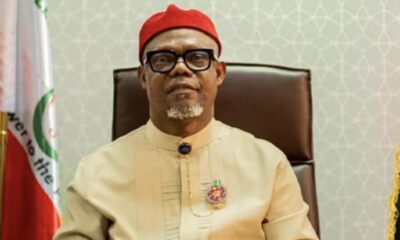
 Politics2 days ago
Politics2 days agoUpdated: Rivers Senator Mpigi Barinada dies at 64
-

 metro2 days ago
metro2 days agoOndo Monarch Killed as Bandits Strike Akure North
-

 Education1 day ago
Education1 day agoOgun Gov Rewards Nigeria’s Best Primary School Teacher with Car, Bungalow







